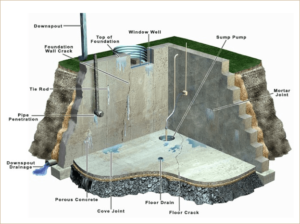Protecting your home from the devastating effects of floods is a top priority for homeowners living in flood-prone areas. With climate change intensifying weather patterns and increasing the risk of flooding, it has become crucial to implement effective flood control measures. One such solution is a flood control system, which provides a comprehensive approach to safeguarding your home against the destructive forces of water. By combining various preventive measures and technologies, such as flood barriers, sump pumps, and drainage systems, a flood control system acts as a reliable defense mechanism. This introductory paragraph explores the importance of protecting your home with a flood control system, highlighting the key components and benefits it offers in mitigating flood-related risks and preserving the safety and integrity of your property.
Introduction To Flood Control Systems: Understanding The Basics
A flood control system is designed to protect your home from the devastating effects of flooding. It consists of various measures and technologies implemented to manage and mitigate floodwater. These systems are crucial, especially in flood-prone areas, as they help minimize property damage and safeguard the well-being of residents. By understanding the basics of a flood control system, including its purpose, components, and functions, you can make informed decisions about protecting your home. Whether it involves structural modifications, such as barriers and pumps, or non-structural solutions like flood alarms and drainage improvements, flood control systems play a vital role in enhancing home safety.

Assessing Your Home’s Vulnerability: Why You Need A Flood Control System?
Assessing your home’s vulnerability to flooding is a crucial step in determining the need for a flood control system. Factors such as location, topography, proximity to water bodies, and past flooding incidents contribute to the level of risk your property faces. A flood control system becomes essential to protect your home from potential damage caused by rising water levels. By conducting a comprehensive vulnerability assessment, you can identify weak points and vulnerabilities that need to be addressed. Implementing an appropriate flood control system based on this assessment will significantly reduce the risk of flood-related damages and provide you with peace of mind.
Types Of Flood Control Systems: Exploring The Options
When it comes to flood control systems, there are various options available to suit different needs and situations. These systems can include flood barriers, floodgates, levees, flood alarms, sump pumps, and even underground drainage systems. Each type of system functions differently but with the common goal of preventing floodwater from entering your home or redirecting it away from vulnerable areas. Understanding the different types of flood control systems allows you to choose the most suitable one based on your location, budget, and specific requirements. Consulting with experts in the field will help you make an informed decision and ensure effective flood protection.
Installation And Maintenance Of A Flood Control System: What To Consider?
Installing a flood control system requires careful planning and execution to ensure its effectiveness. Professional installation is recommended to guarantee proper positioning and functionality of the system components. During installation, factors such as terrain, soil conditions, and water flow patterns must be considered. Additionally, regular maintenance is crucial to keep the system in optimal working condition. This involves inspecting and cleaning the system components, testing pumps and alarms, and addressing any repairs or replacements promptly. By paying attention to installation and maintenance requirements, you can maximize the longevity and efficiency of your flood control system.
Key Components Of An Effective Flood Control System
A well-designed flood control system comprises several key components that work together to protect your home. These components may include flood barriers, floodgates, check valves, sump pumps, drainage systems, and flood alarms. Flood barriers and gates act as physical barriers to prevent water from entering vulnerable areas, while check valves prevent water from backing up through drains. Sump pumps remove excess water from basements or lower-lying areas, and drainage systems redirect water away from your property. Flood alarms provide early warning signs, allowing you to take necessary precautions. Each component plays a vital role in the overall effectiveness of the flood control system.
How Flood Control Systems Work?: A Step-By-Step Explanation
Understanding how flood control systems work can help you grasp their functionality and importance. Typically, these systems operate by diverting floodwater away from your home or preventing its entry altogether. The first step involves detecting rising water levels through flood sensors or alarms. Once detected, flood barriers, gates, or check valves are activated to block the water’s path. Sump pumps then remove excess water, while drainage systems ensure proper water flow away from the property. By following this step-by-step process, flood control systems help mitigate the risks associated with flooding and protect your home from water damage.
Benefits Of Implementing A Flood Control System In Your Home
Implementing a flood control system in your home offers numerous benefits. First and foremost, it provides effective protection against flood-related damages, preserving the integrity of your property and its contents. A flood control system also enhances the safety and well-being of your family by minimizing health hazards associated with flooding, such as mold growth and contaminated water. Moreover, it can increase the value of your home and potentially reduce insurance premiums by demonstrating proactive measures to mitigate flood risks. Overall, investing in a flood control system is a proactive and prudent step to safeguard your home and the people within it.
Choosing The Right Flood Control System For Your Specific Needs
Choosing the right flood control system requires considering several factors specific to your home and location. Factors such as flood risk level, property layout, budget, and personal preferences all play a role in determining the most suitable system. Consulting with flood control experts and professionals can provide valuable guidance in assessing your needs and recommending appropriate solutions. It is essential to weigh the pros and cons of different options, considering their effectiveness, maintenance requirements, and long-term costs. By making an informed decision, you can ensure that the flood control system you choose meets your specific needs and provides reliable protection.
Additional Measures To Enhance Home Protection With A Flood Control System
While a flood control system forms the primary defense against flooding, implementing additional measures can further enhance home protection. These measures can include elevating utilities and appliances above potential flood levels, using water-resistant building materials, and sealing vulnerable points, such as windows and doors. Creating proper landscaping slopes away from the house and installing rain barrels or cisterns to collect excess water are also beneficial. Additionally, having an emergency preparedness plan and adequate insurance coverage are essential. By combining a flood control system with these supplementary measures, you can significantly reduce the risk of flood damage and ensure comprehensive home protection.
Conclusion
Protecting your home with a flood control system is crucial for mitigating the devastating effects of flooding. By understanding the basics of flood control systems and assessing your home’s vulnerability, you can make informed decisions about the type of system you need. The installation and maintenance of the system should be done by professionals to ensure its effectiveness. Key components, such as barriers, pumps, and alarms, work together to provide comprehensive protection. Implementing a flood control system offers numerous benefits, including property preservation, enhanced safety, increased home value, and potential insurance savings. Choosing the right system for your specific needs and complementing it with additional protective measures further enhances home safety. With a well-designed flood control system, you can minimize the risks associated with flooding and safeguard your home and loved ones.

Allison Cheng is a Michigan-based health enthusiast with extensive experience in lifestyle and fitness coaching. She has a special expertise in nutrition and mental health coaching. She is passionate about helping people become their best selves through health and wellness, and loves to share her knowledge and experiences through her blog and health coaching practice.



